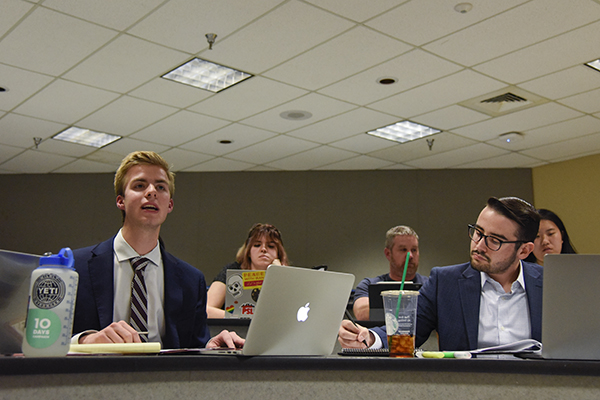In a unanimous decision, the UT Student Government Supreme Court ruled the Election Supervisory Board was correct in determining Connor Alexander and Camille Johnson’s Executive Alliance campaign engaged in early campaigning and mass solicitation. The campaign has not been requalified as of Wednesday night.
The court heard an appeal from Alexander and Johnson’s campaign counsel on Wednesday. The court determined that Fox Walker, a government and Arabic sophomore and the outreach director for the campaign, was responsible for the action that got the campaign fined 5% of their total campaign funds and disqualified for spending over the 120% budget limit.
Nick Senktas, an economics and international relations sophomore and counsel for the campaign, argued the email Walker sent to Livia Frost, public health sophomore and co-president of UT’s chapter for Doctors Without Borders, two days before the authorized campaigning period was to set up a time to meet. However, Sergio Cavazos, a law student and Election Supervisory Board chair, said because the email was sent to the Doctors Without Borders club and not Frost directly, it was an act of mass solicitation.
The campaign counsel also answered questions regarding campaign expenditures. Senktas argued the Election Supervisory Board should clarify and update when financial disclosures are due during the campaign season. Currently, Senktas said Student Government campaigns are only required to submit financial disclosures on the first and last days of campaigning, which are Feb. 17 and March 3.
Senktas said the Camille and Connor campaign intended to update their financial disclosure before the Election Supervisory Board ruled that they had exceeded campaign spending.
The campaign purchased wood and paint that did not end up being used, Senktas said. The counsel argued that because the wood and paint were not used to gain votes, they should be able to remove the expenditure from the financial disclosure form and potentially no longer exceed the 120% spending limit.
“It is not possible for Election Supervisory Board to have second-by-second updates of campaign expenditures,” Senktas said.
Cavazos rebutted Senktas’s arguments by stating candidates may provide the Election Supervisory Board with additional information during their campaign.
Cavazos said the campaign decided to remove the expenditure from the financial disclosure form to requalify for the election after the Election Supervisory Board declared they exceeded campaign spending.
The Student Government Supreme Court denied Alexander and Johnson’s second request for appeal after deliberation following a hearing Wednesday night.
According to the court decision, the appeal was denied because the court stood by the Election Supervisory Board determination that the executive alliance campaign engaged in early mass campaigning.
Editor's note: This story was updated to include the results of the second appeal.





















